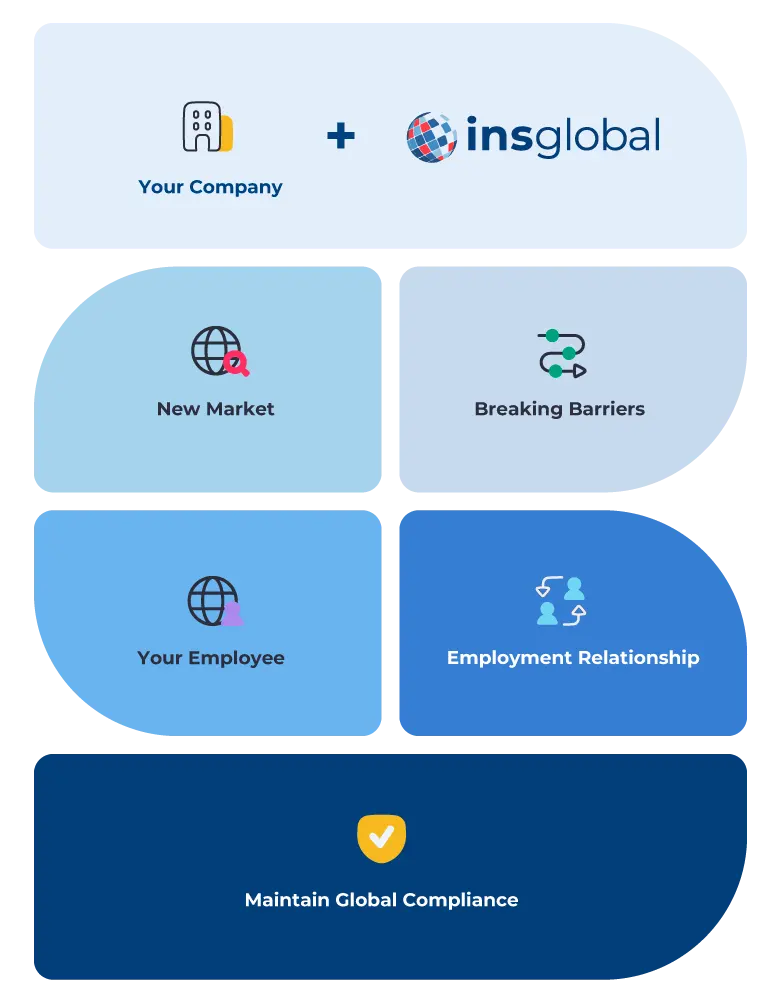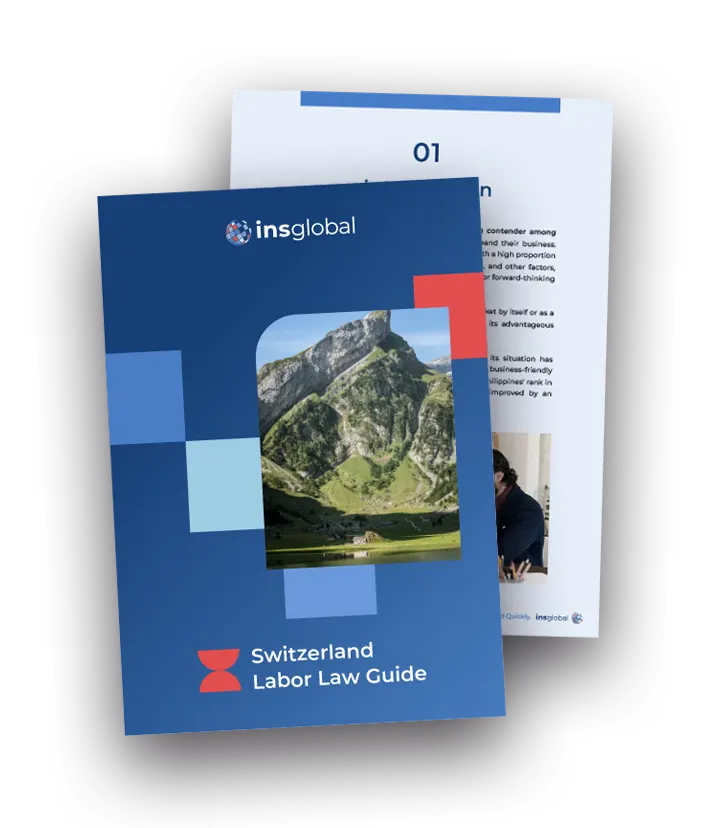- SOLUTIONS
-
- Countries
- Stories
- About Us
-
-
- HOW CAN WE HELP?
- Find out how we can assist you to achieve higher growth through services that are tailored to your company needs.
-
- GLOBAL INSIGHTS
Country Guide

Capital City
Languages
Currency
Population Size
Employer Taxes
Employee Costs
Payroll Frequency
Switzerland, known for its robust economy and strategic position in the heart of Europe, offers unparalleled opportunities for businesses looking to expand internationally. However, entering the Swiss market involves navigating a complex network of labor laws and tax regulations. An Employer of Record (EOR) in Switzerland can streamline this process, acting as your local partner to ensure a smooth market entry and ongoing compliance with all essential legal requirements
Want to have a Team in Switzerland TODAY?


Tired of scrolling? Download a PDF version for easier offline reading and sharing with coworkers
While establishing a subsidiary in Switzerland is a viable option, choosing an EOR offers distinct advantages:
The Advantage in Figures
PEO/EOR
Company Incorporation
Price
80% Less Expensive
Market Entry
2-5 Days
6 Months

Hassle-Free Market Entry
An EOR in Switzerland streamlines your entry into the market by managing intricate tax systems and labor laws, ensuring your compliance from day one.
Expert Compliance Management
Switzerland’s regulatory environment can be challenging, but EORs possess the expertise to keep your business in full alignment with local tax laws, labor regulations, and social security obligations.
Risk Mitigation and Legal Protection
As your legal employer in Switzerland, an EOR minimizes the risks associated with employment regulations, ensuring that your business remains fully compliant and protected from potential liabilities.
Concentration on Core Business Strategies
By outsourcing HR functions such as recruitment, payroll processing, and tax management to an EOR, you can focus on driving your core business activities and achieving strategic growth.
Cost-Efficient Operational Strategy
EOR services in Switzerland provide a cost-effective alternative to establishing a local subsidiary, particularly for smaller teams or temporary ventures, helping you avoid the significant costs of incorporation and ongoing administrative burdens.
Choosing the right EOR in Switzerland is crucial for successful business expansion. Keep these 5 key factors in mind:
1
Established Reputation and Experience – Look for an EOR in Switzerland with a well-established reputation and a proven track record, such as INS Global. Positive client reviews and industry awards can indicate their reliability and expertise.
2
Comprehensive Services – Ensure the EOR in Switzerland offers a full range of services or can tailor their offerings to meet your specific needs. This could include visa and work permit assistance, payroll management, tax compliance, and navigating Switzerland’s intricate tax and labor laws.
3
Adaptability and Growth Support – Select an EOR in Switzerland that can scale its services in line with your business growth. They should be equipped to manage an expanding workforce and adapt to evolving business demands.
4
Effective Communication and Transparency – Choose an EOR in Switzerland known for clear and consistent communication. They should keep you updated on regulatory changes, deadlines, and any potential issues. A dedicated point of contact and accessible online tools are essential for easy access to critical information.
5
Clear and Competitive Pricing – Evaluate the pricing models of different EOR providers in Switzerland. Ensure their fees are transparent, competitive, and free from hidden charges. Consulting independent reviews can help you secure the best value for your investment.
When considering a partnership with a PEO in Switzerland, you will likely also hear the term EOR (Employer of Record). Typically, the two terms are largely interchangeable based on the kind of services they offer. The main difference between the two is the level of liability taken on by the PEO/EOR and the parties involved in the agreement.
In Switzerland both services are indistinct according to national regulations, but INS Global can offer any elements of both according to your requirements
Check Our Switzerland Labor Law Guide

Working Hours
Holidays and Annual Leave
Sick Leave
Parental Leave
Contact Us Today
faqs
An EOR ensures that your business remains compliant with all Swiss labor laws, including employment contracts, working hours, and employee benefits. They handle the complexities of local regulations, so you don’t have to worry about legal pitfalls.
Yes, an EOR in Switzerland can manage employment contracts in German, French, Italian, or English, depending on the region. They ensure that the contracts meet local legal standards, regardless of the language.
An EOR helps set up probationary periods in compliance with Swiss law, typically lasting up to 3 months but extendable to 6 months by mutual agreement. They handle all the legal documentation and termination processes if needed during this period.
An EOR monitors employee working hours to ensure compliance with Swiss labor laws, which include strict limits on overtime. They manage the compensation for overtime, whether through higher wages or compensatory time off, in accordance with legal requirements.
An EOR in Switzerland ensures that any employee terminations are handled in compliance with Swiss labor laws, including notice periods and, if applicable, severance pay. They provide guidance on legal grounds for termination and manage the necessary paperwork.
Yes, an EOR handles all contributions to the Swiss social security system, including health insurance, pensions, and unemployment insurance. They ensure that both employer and employee contributions are accurately calculated and submitted on time.
An EOR manages all aspects of paid leave, including annual leave, sick leave, and public holidays, which vary by canton. They ensure that employees receive their entitled benefits in compliance with Swiss labor laws.

A Global Employer of Record is an effective solutions for companies like yours that are looking to expand a workforce abroad effortlessly.
This approach allows you to outsource the international hiring process quickly and efficiency, providing access to a global talent pool while still managing payroll compliance in each country.
Public Holidays Calendar
Switzerland
| Date | Day | Holiday | Notes |
| 1 January | Wednesday | New Year’s Day | Observed nationwide |
| 29 May | Thursday | Ascension Day | Observed nationwide |
| 1 August | Friday | Swiss National Day | Only official federal holiday; observed nationwide |
| 25 December | Thursday | Christmas Day | Observed nationwide |
Download the PDF Guide